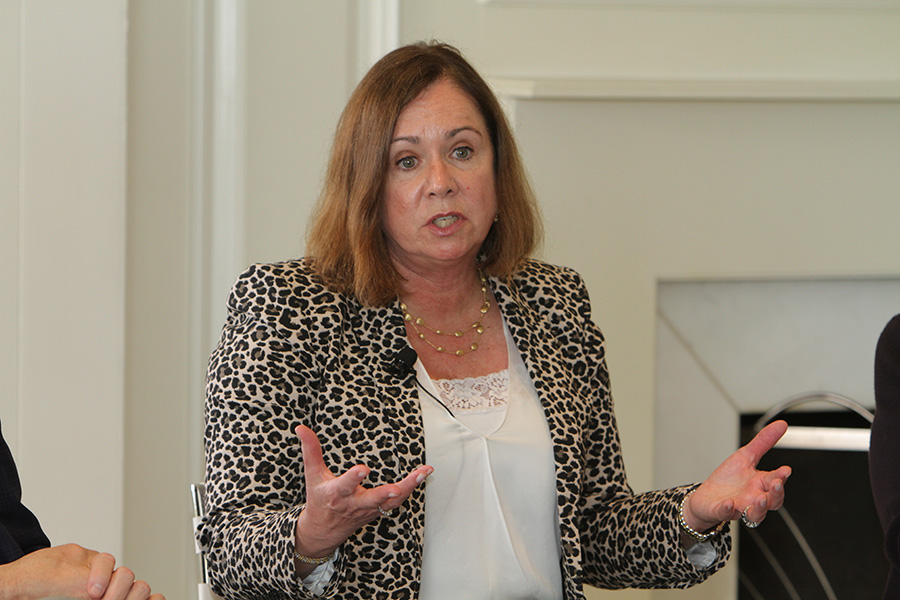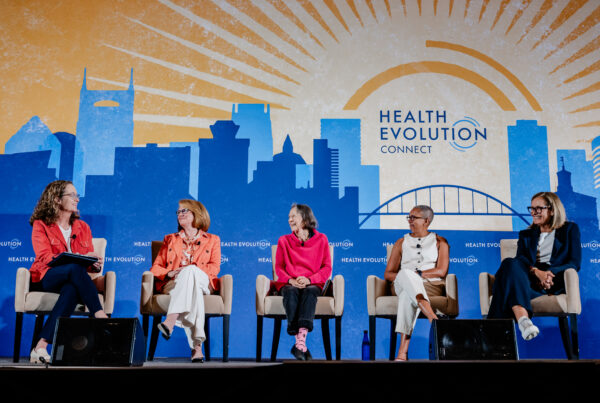ChristianaCare CEO Janice Nevin, MD, aspires to make everything digital that can be and shift care delivery into the home as much as possible. Toward that end, the organization’s leadership asks itself if and when it might instead become a data company serving health care customers.
Nevin has been president and CEO of ChristianaCare, Delaware’s largest provider, since 2014. In that time, she spearheaded the organization’s development of a data-driven care platform called CareVio. She also led the eBrightHealth alliance, an ACO to improve care quality in the region and, just this summer, a new value-based care agreement with Highmark Health Options.
Nevin joined ChristianaCare in 2002 and has served as chief medical officer, chief patient safety officer, chair of the Department of Family and Community Medicine and, among other roles, clinical chair of the Women First Center of Excellence.
Health Evolution Editor-in-Chief Tom Sullivan spoke with Nevin about her strategic priorities, the biggest risk she has ever taken as CEO, and the advice she gleaned when meeting Cerner’s former Chief Executive Neal Patterson alongside Delaware Senator Tom Carper.
Health Evolution: When you look 3-5 years into the future, what are your top priorities as CEO?
Nevin: Access, affordability, and digital health. We have to provide access in a way that meets people where they are in the community – and we have to create the kind of experience that creates value for people, allows them to achieve the health goals they set for themselves, and to do it in a way that is affordable.
Clearly building a layer of mental health access is also critical to success and we’re rethinking how we impact the social determinants of health. As a system we’ve always played the role of being a good citizen in our community. We created a community portfolio and we are explicitly saying “we’ll invest in housing, in food insecurity, in violence prevention,” as examples. We’re going to track those investments to see how they’re doing.
And we want everything that can be digital to be digital, and everything should be provided in the home, unless it can’t be – that’s our aspiration. We’ve been asking ourselves: by 2025, will we be a data company that happens to deliver health?
Health Evolution: Let’s talk about that. Will you be a data company by 2025? Or is it more of a rhetorical query?
Nevin: I don’t think we’ve answered it. But we use the question as a way to push ourselves to think about the future.
Health Evolution: Certainly there’s a growing mantra among some visionaries that every organization will become a tech company in some capacity …
Nevin: That’s how we’re thinking about it. It’s an aspiration. Health systems are extraordinarily complex and we’re now tasked with having to fundamentally change how we function. It’s the many systems that have been built up to support what we have, the EHR, the regulatory environment in which we live. And we have communities that depend on us and still want the human touch, the empathy that’s so needed when they are experiencing something incredibly vulnerable. That’s what makes the work really exciting. The promise of making a difference, an impact on health and care affordability is what gets me out of bed every day. The actual work of getting it done at scale is the challenge.
Health Evolution: Speaking of challenges, what would you say is the biggest business risk you’ve taken as CEO?
Nevin: Three years ago, in an effort to prepare our people for the uncertainty we’re living in and the continued ambiguity, it was time to focus on our core values. This needed to be done in a way that would engage all 12,000 of our caregivers in partnership between leadership and the front lines. Over 9 months we worked together and did it in a way that exceeded my expectations.
It’s now: We serve together, guided by our values of excellence and love.
Health Evolution: What was the inherent risk in drawing up those new core values?
Nevin: We wanted to send the message that we work across teams, that excellence is in our DNA, and the word love was the real surprise. I wasn’t expecting that. And it was a little bit risky because when the organization engaged in a conversation about love, there were voices who said it was not appropriate. But there were many more who were intrigued and said “of course you can talk about love.” We learned that love is allowing us to do hard things. Now we say, “where love leads excellence is inevitable.”
Health Evolution: It’s interesting to see the word ‘love’ enter the values of just about any kind of business. Have you seen it elsewhere?
Nevin: Not prominently. I do believe we’re pioneering and what’s really interesting is we did a re-brand about two weeks ago that was somewhat inspired by our values of love and excellence. Our name is now ChristianaCare, one word, not Christiana Care Health System. We even trademarked “For the Love of Health,” as a tagline.
Health Evolution: Last question. What’s the best piece of leadership advice you ever received?
Nevin: When I became CEO I had the chance to meet with Neil Patterson (who passed away in 2017) and Sen. Tom Carper. They both said the same thing when I asked for advice: You have to have the courage as CEO to do the right thing even when it’s the hardest thing. That resonated and is something I think about a lot.










